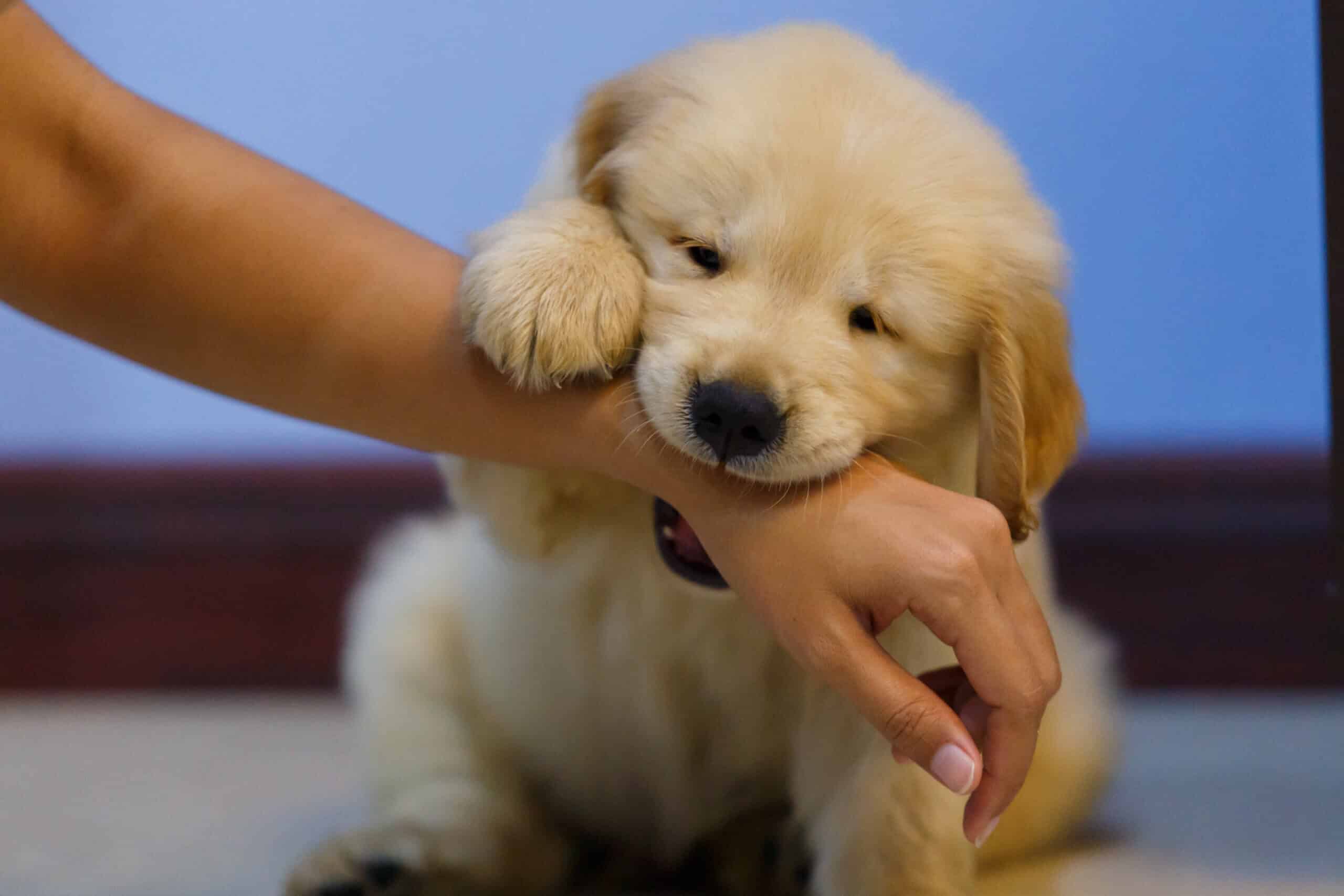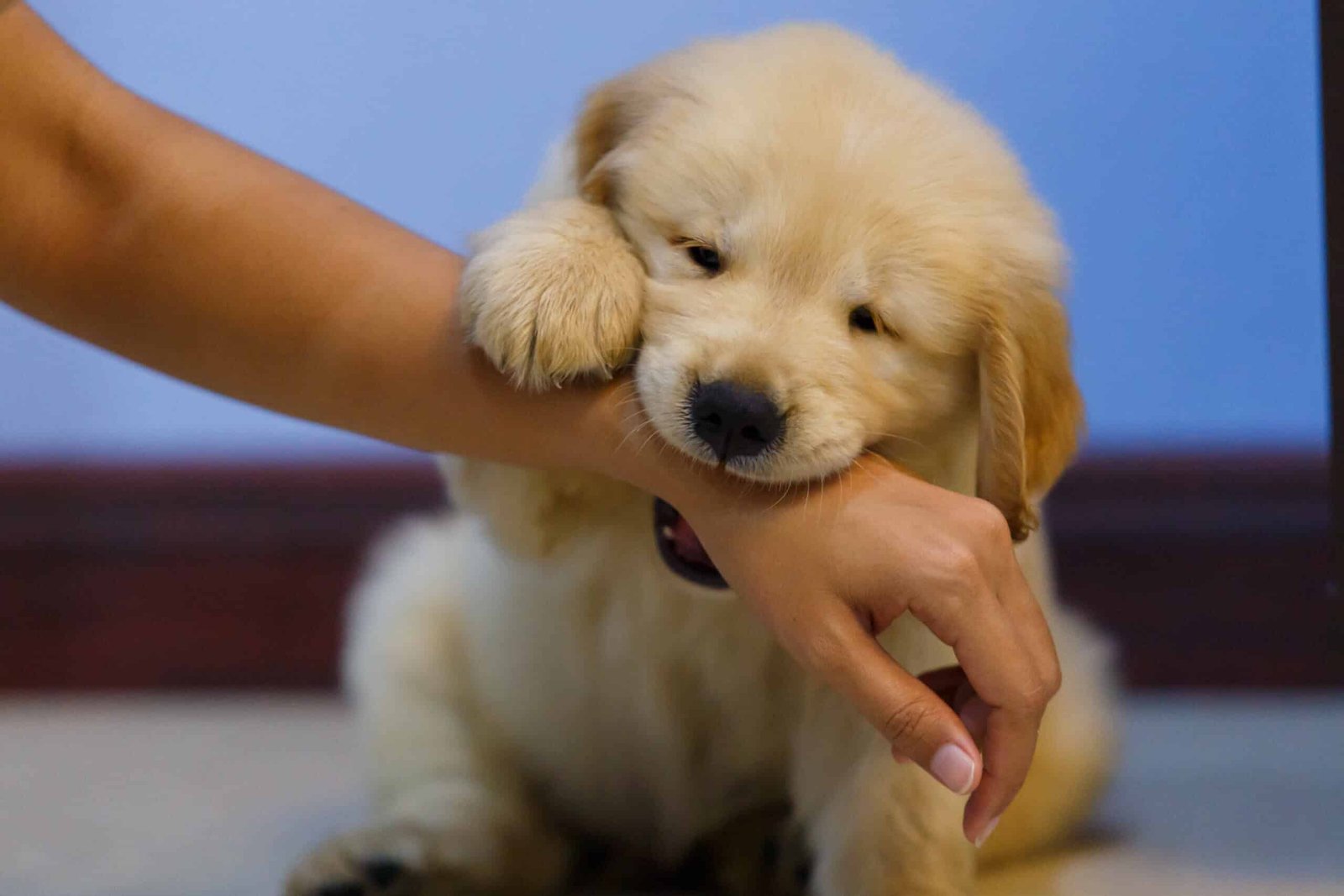If you’ve ever wondered, “how long do golden retriever puppies bite?” you’re in the right place! Golden retriever puppies are known for their playful and lively nature, but their biting phase can be quite an adventure. In this guide, we’ll explore how long this stage typically lasts, why it happens, and what you can do to navigate through it. So, let’s dive in and find out more about these adorable little chewers!
Golden retriever puppies usually go through a biting phase that starts around the age of 8 to 12 weeks. This is completely normal behavior for puppies as they explore the world around them and learn to interact with their environment. During this stage, they use their mouths to explore, play, and even alleviate teething discomfort. But don’t worry, this phase doesn’t last forever!
On average, the biting phase in golden retriever puppies lasts for about 3 to 4 months. However, every puppy is unique and may go through this stage for a shorter or longer period. It’s essential to remember that during this time, puppies aren’t being aggressive or trying to hurt you intentionally. They’re simply learning and interacting with their surroundings through play and exploration. So, hang in there, and with a little patience and training, this biting phase will soon become a thing of the past!

How Long Do Golden Retriever Puppies Bite?
Golden Retriever puppies are known for their playful and energetic nature. They go through a teething phase during which they bite and chew on various objects, including hands and feet. This behavior is normal for puppies, but many owners wonder how long it will last. In this article, we will explore the duration of biting behavior in Golden Retriever puppies and provide tips on how to effectively manage and redirect this behavior.
Understanding the Teething Stage
During the teething stage, Golden Retriever puppies start to lose their baby teeth and the permanent ones begin to emerge. This process usually starts around 3 to 4 months of age and can last up to 7 or 8 months. The discomfort and itchiness associated with teething can cause puppies to bite and chew on objects as a way to alleviate the discomfort. It’s important to note that every puppy is unique, and the duration of the teething stage may vary.
Teething can be an uncomfortable experience for Golden Retriever puppies, and they may find relief by biting on anything they can get their paws on. It’s crucial for owners to provide appropriate chew toys, such as rubber toys or specially designed teething rings, to redirect their puppies’ biting behavior. Regularly inspecting the chew toys for any signs of damage or wear is essential to ensure the puppy’s safety.
Managing Biting Behavior
While it’s natural for Golden Retriever puppies to bite during the teething stage, it’s important to teach them proper bite inhibition. Here are some strategies to manage biting behavior:
1. Provide appropriate chew toys: As mentioned earlier, offering chew toys to your puppy will not only help redirect their biting behavior but also provide relief during the teething stage.
2. React appropriately: When your puppy bites you, let out a yelp or say “ouch” in a high-pitched voice to mimic the reaction of a littermate. This will signal to the puppy that their bite was too hard. Avoid aggressive or physical responses, as this may worsen the biting behavior.
3. Reinforce positive behavior: Whenever your puppy shows gentler behavior or redirects their biting to a toy, reward them with praise and treats. Positive reinforcement helps reinforce desired behavior and encourages your puppy to choose appropriate chewing outlets.
4. Socializing and training: Exposing your puppy to various people, animals, and environments from an early age helps them develop good social skills. Puppy training classes can also provide an avenue for structured learning and discipline.
5. Seek professional help if necessary: If your puppy’s biting behavior becomes excessive, consult a professional dog trainer or behaviorist. They can provide guidance tailored to your puppy’s specific needs.
Remember that consistency, patience, and positive reinforcement are key when managing biting behavior in Golden Retriever puppies.
Benefits of Redirecting Biting Behavior
Redirecting biting behavior in Golden Retriever puppies has several benefits.
1. Protects household items and personal belongings: By providing appropriate chew toys and redirecting their biting behavior, you can prevent your puppy from damaging furniture, shoes, and other valuables.
2. Ensures safety: Redirecting biting behavior minimizes the risk of accidental injuries to both the puppy and the people around them. Encouraging bite inhibition helps the puppy understand the appropriate level of force to use during play or interaction.
3. Builds trust and strengthens the bond: When you redirect your puppy’s biting behavior with positive reinforcement, you build trust and establish a stronger bond. This creates a foundation for a lifelong relationship based on mutual respect and understanding.
Redirecting biting behavior is an important part of raising a well-behaved and socialized Golden Retriever. By understanding the teething stage, implementing effective management techniques, and providing appropriate chew toys, you can navigate this phase of puppyhood with confidence and set a strong foundation for positive behavior.
How Long Do Golden Retriever Puppies Bite?
- Golden Retriever puppies often start biting at around 8-10 weeks of age.
- Biting is a normal behavior for puppies as they explore and learn about the world using their mouths.
- Biting behavior usually peaks between 3-6 months of age.
- Consistent training and socialization can help reduce and eventually stop biting behavior in Golden Retriever puppies.
- With proper training and guidance, most Golden Retriever puppies stop biting by the time they reach 6-8 months of age.
Frequently Asked Questions
Are you curious about how long golden retriever puppies bite? We’ve got the answers for you. Take a look at these commonly asked questions related to the topic.
Why do golden retriever puppies bite?
Golden retriever puppies are known for their playful nature and biting is a natural behavior for them. When they are young, puppies explore their world through their mouths. They use biting as a way to learn and interact with their surroundings. Additionally, biting is a part of their teething process, as their new teeth emerge and they seek relief from the discomfort.
It’s important to note that golden retriever puppies do not bite maliciously or to cause harm. They usually do it out of curiosity or playfulness. However, it’s crucial to train them to control their biting behavior to prevent any accidental injuries or damage to personal belongings.
How long does the biting phase last for golden retriever puppies?
The duration of the biting phase in golden retriever puppies varies from one dog to another. Generally, this phase starts around the age of 3 to 4 months and can last until they are around 6 to 7 months old. During this period, their biting may be more intense and frequent. However, with proper training and consistent reinforcement, you can help reduce this behavior and guide them towards more appropriate ways of playing and exploring.
Remember, biting is a natural part of their development, and it is important to be patient and understanding throughout this stage. Consistency, positive reinforcement, and redirecting their attention to appropriate toys or activities can help speed up this phase and encourage them to develop better chewing habits.
How can I stop my golden retriever puppy from biting me?
Stopping a golden retriever puppy from biting requires consistent training and patience. Here are a few tips to help you address this behavior:
1. Provide appropriate chewing toys: Make sure your puppy has access to a variety of toys designed for chewing. This will redirect their biting behavior to more suitable objects and help alleviate their teething discomfort.
2. Use positive reinforcement: Reward your puppy with praise and treats when they chew on their toys instead of biting you. Positive reinforcement helps them associate good behavior with rewards and encourages them to repeat it.
3. Socialize your puppy: Expose your puppy to different people and dogs from a young age, as this helps them learn appropriate biting inhibition. Engaging in puppy socialization classes can also be beneficial.
4. Time-outs: If your puppy becomes too rough during play and starts biting, calmly remove yourself and the source of their attention. This teaches them that biting leads to the end of playtime, helping them understand that biting is not acceptable behavior.
Remember, consistency and patience are key when dealing with biting behavior. Keep in mind that all puppies go through this phase, and with proper training, they will gradually learn better manners.
Is it normal for golden retriever puppies to bite children?
While it is normal for golden retriever puppies to bite during their teething phase, it’s essential to supervise their interactions with children. Puppies can sometimes get carried away with their play and accidentally hurt children, especially when they are in the early stages of learning bite inhibition.
It is crucial to teach children how to properly interact with a puppy, including gentle play and proper handling. Additionally, always supervise interactions between children and puppies to ensure everyone’s safety. If the biting behavior becomes a concern, it’s best to seek guidance from a professional dog trainer or behaviorist who can provide specific strategies for managing the situation.
When should I be worried about my golden retriever puppy’s biting behavior?
While biting is a normal behavior for golden retriever puppies, there are instances when you should be concerned and seek professional advice. If your puppy’s biting goes beyond playful mouthing, intensifies over time, or becomes aggressive, it is important to address the issue promptly.
Consulting with a professional dog trainer or behaviorist can help evaluate the situation and provide guidance tailored to your specific circumstances. They can identify any underlying reasons for the biting behavior and develop a training plan to correct it. Remember, addressing any concerning behavior early on can help prevent future problems and ensure a harmonious relationship with your furry friend.

Summary
Golden Retriever puppies tend to bite while teething, which lasts until they are around six months old. This behavior is normal and helps them explore the world around them. However, it’s important to train them not to bite and redirect their chewing to appropriate chew toys. Consistent training and positive reinforcement can help them learn this behavior quickly.
As your puppy grows older, their biting tendency should decrease. By the time they reach adulthood, most Golden Retrievers have outgrown their biting phase. Remember to provide them with plenty of toys and appropriate outlets for their energy to help prevent biting. With patience and training, you can enjoy a well-behaved and bite-free companion.
